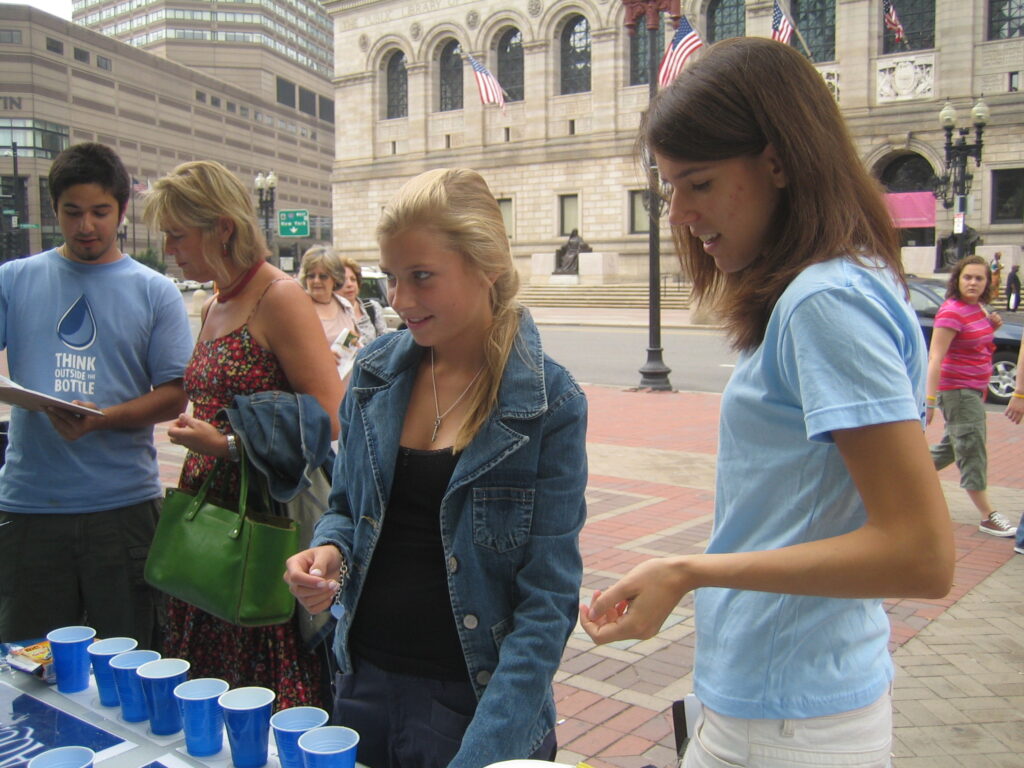I carried a folding table across the quad at Brown University with Paige, another student organizer (and now Corporate Accountability board member). As the cool fall breeze stirred the leaves, I wished I had grabbed my jacket. But I warmed up soon enough as we set up the table in front of the student center. We arranged our fliers and carefully poured water into paper cups. At the top of the hour, students hurried out of their classes. We stood in front of the table and called out: “Are you up for the tap water challenge?”
This was 2009, and the bottled water industry’s profits were skyrocketing. Over the past few decades, it had spent millions of dollars on slick PR and advertising to promote its product. Which was, of course, water in single-use plastic bottles. Water sourced either from the tap or extracted from springs and aquifers around the world, mostly for pennies on the gallon.
As a result, people didn’t think twice about spending a couple of bucks for bottled water when they were thirsty. The industry, reaping billions in profit, had successfully hidden the true cost: plastic waste, draining of springs and aquifers against local communities’ wishes, and disinvestment in public water systems.
My fellow student organizers and I were part of the movement to change all that. As people gathered around our table, we offered them four cups. One was filled with tap water, the others with leading brands of bottled water. The challenge? Guess which one was the tap water.
Over and over, people would guess wrong. Tap water tasted just as good, if not better than bottled. Once the answer was revealed, we explained to them how the bottled water industry was profiting from commodifying our water.
Most eagerly signed our petition to expand tap water infrastructure on campus. And they pledged to choose tap water over bottled.

Organizers in Boston invite people to take the Tap Water Challenge, 2007
Challenging the bottled water industry on my college campus gave me my first taste of going toe-to-toe with the power of transnational corporations. When I learned I could make a career out of doing so, I was hooked.
A few years later, I found my way onto staff at Corporate Accountability. Here, the campaign to “Think Outside the Bottle” was racking up victories for public, democratically controlled water systems.
We partnered with organizers in small communities on the front lines of the bottled water industry’s extraction. And we collaborated with organizations like The Story of Stuff Project and Food & Water Watch. Together, all of us grew the movement to stop the industry from commodifying our water.
Our tactics applied direct pressure on corporations like Coca-Cola, PepsiCo, and Nestlé. We organized people, restaurants, local businesses, and institutions to reject bottled water.
And we shifted the narrative and changed public expectations. Do you carry a reusable bottle with you when you go out? If so, you’ve been touched by this movement.
Powerful recent victories
I won’t go into the whole history of the campaign with all its highs and lows. But I am excited to celebrate a string of recent victories around bottled water and single-use plastic bottles that our allies have secured.
This progress is the result of more than a decade of movement building and organizing with people like you. If you’ve ever taken action for public water, you’re a crucial part of these victories.
Last year, one of our long-time campaign demands was met! Secretary of the Interior Deb Haaland issued an order to phase out single-use plastics in national parks by 2032. This will mean a significant reduction in plastic waste littering some of the wildest places in the U.S.—from forests to oceans to canyons.
More recently, Governor Maura Healey issued an order that ensures the state of Massachusetts will no longer purchase single-use plastic bottles. Similarly, this victory will reduce plastic waste. And it can boost the political will of government officials to strengthen Massachusetts’s public water systems.
And the California State Water Board ordered the owner of Arrowhead brand bottled water (formerly owned by Nestlé) to drastically reduce its extraction of water from the San Bernardino National Forest. For decades, corporations have been reaping massive profit from the water in the national forest while creeks run dry. The recent order is an important step for justice for the people and creatures affected by this water profiteering.
These wins show that the movement challenging the bottled water industry reaches far beyond our “Think Outside the Bottle” campaign. They demonstrate what it looks like to be part of long-term movements for justice and a thriving future.
Building a movement
During the height of this campaign, we organized with communities from Florida to Michigan to protect their water sources from extractive corporations that wanted to bottle the communities’ water.
We mobilized members like you and others to successfully demand that hundreds of institutions, local governments, and places of business end bottled water purchases. Our organizing led six states to “think outside the bottle,” long before this most recent victory in Massachusetts.
And, together, we built a movement among U.S. national parks to end the sale of single-use plastic bottles. In fact, many members like you led “bottled-water-free visits” to your favorite national parks—and the park rangers listened. Dozens of parks nationwide—including some of the most iconic like the Grand Canyon and Redwood National Park—had ended the sale of bottled water long before Secretary Haaland issued her order!
All of this organizing helped build power towards these recent victories. Members like you have helped create a climate where public officials can take action protecting sacred and life-giving water from the profit motives of corporations.
Ultimate goal: safe water for everyone—no exceptions
We do this work because we believe in a world where everyone—no matter their neighborhood or what they look like—can have clean water.
Thanks to our and our allies’ campaigning, more and more people started seeing the truth behind the bottled water industry’s deception.
But for everyone to be able to drink safe water from the tap—with service rates everyone can afford—we need public water systems that are democratically controlled, robustly funded, and accountable to the people.
That’s why, today, we’re strategically focused on our public water systems. We organize with communities most targeted by water privatizers to not only keep water in public hands, but ensure that our public water systems serve everyone—no exceptions.
I can honestly tell you that my 19-year-old self who organized the tap water challenge on my college campus would have been floored by the progress this movement has made.
When we’re in the day to day, it can sometimes be hard to see how we are making a difference. But when we win victories, we can clearly see the strategic, long-term, relationship-based organizing that has led to these moments—and will lead us to more such victories in the future.
It might be a long road toward justice, but I’m inspired to be on it with you, our allies, and people around the world!







